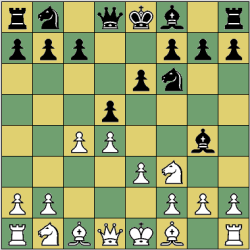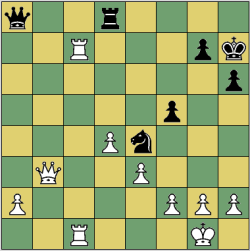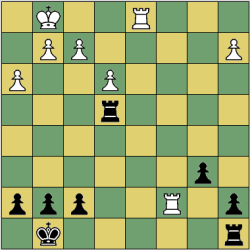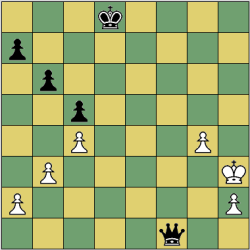Mystery chess position II
 I took a look at this blog and noticed that I almost only post positions from games I lost. I do believe that analyzing the reasons behind loosing a game is more efficient for learning to play better chess than looking at won games. Nevertheless, I decided to brag a little and write a short post about a game I actually won (Yes, this happens every now and then!).
I took a look at this blog and noticed that I almost only post positions from games I lost. I do believe that analyzing the reasons behind loosing a game is more efficient for learning to play better chess than looking at won games. Nevertheless, I decided to brag a little and write a short post about a game I actually won (Yes, this happens every now and then!).The game started with some pretty normal development moves with me playing white. The diagram on the right shows the position after black playing 4. ... e6. Being a correspondence chess game, I consulted a database and found that the most popular moves among master-level chess players in this situation is 5. Qb3. The games with this move looked interesting, so I decided to go with this (Sometimes, I spend a tremendous time to prepare a single move in a correspondence chess game, but more often I mess it up with a thoughtless move).
 Nevertheless, I felt a bit uncomfortable with this, because black may respond with 5. ... Bxf3 and I would have to recapture with gxf3, making my (future) castle a mess. I guess that the reasoning behind playing 5. Qb3 is the threat of winning a pawn with 6. Qxb7 (other opinions on this are appreciated). However, after some bad experiences I vowed to stop chasing pawns with my queen that early in the game.
Nevertheless, I felt a bit uncomfortable with this, because black may respond with 5. ... Bxf3 and I would have to recapture with gxf3, making my (future) castle a mess. I guess that the reasoning behind playing 5. Qb3 is the threat of winning a pawn with 6. Qxb7 (other opinions on this are appreciated). However, after some bad experiences I vowed to stop chasing pawns with my queen that early in the game.The game continued pretty well for me winning a rook for a knight with a fork. The diagram on the left shows the position after 31. ... Ne4. I continued with 32. Qf7 which I though would be a pretty good move. To my dismay, however, my trusty computer chess engine Crafty found an even better one in the post-mortem computer analysis. Does anyone see the winning combination? The complete annotated game can be found here.




